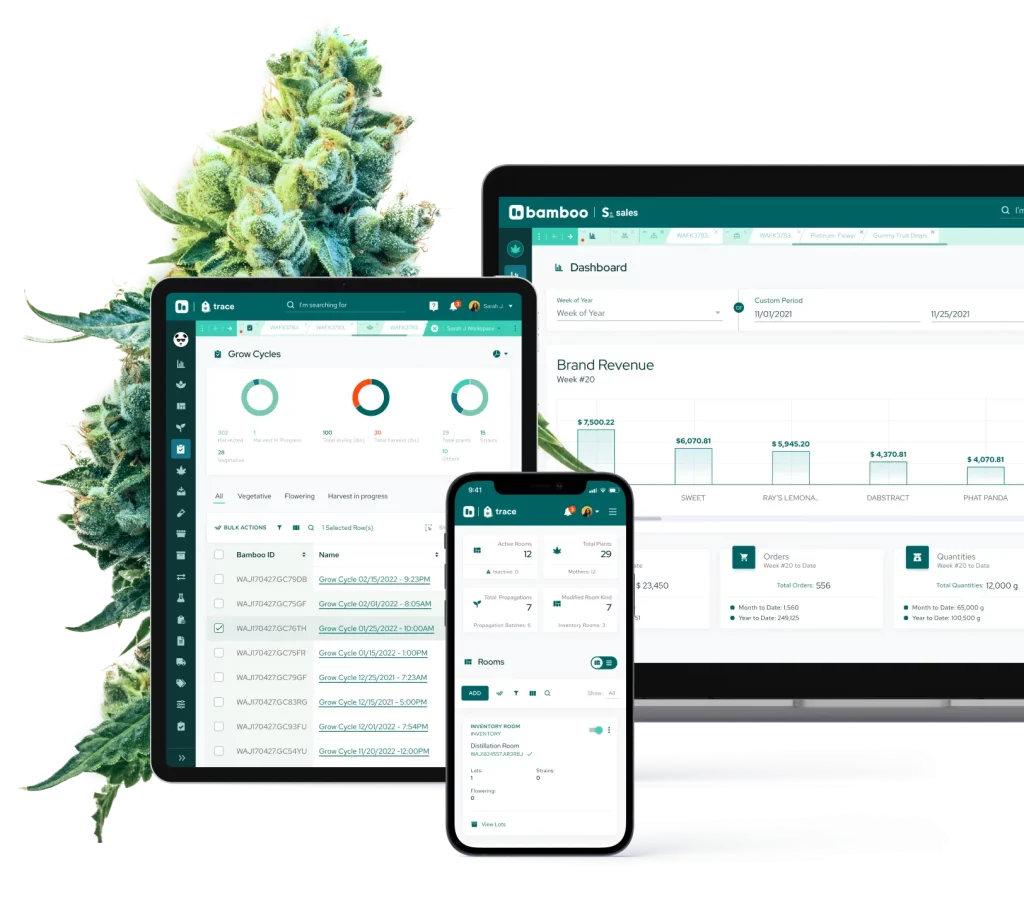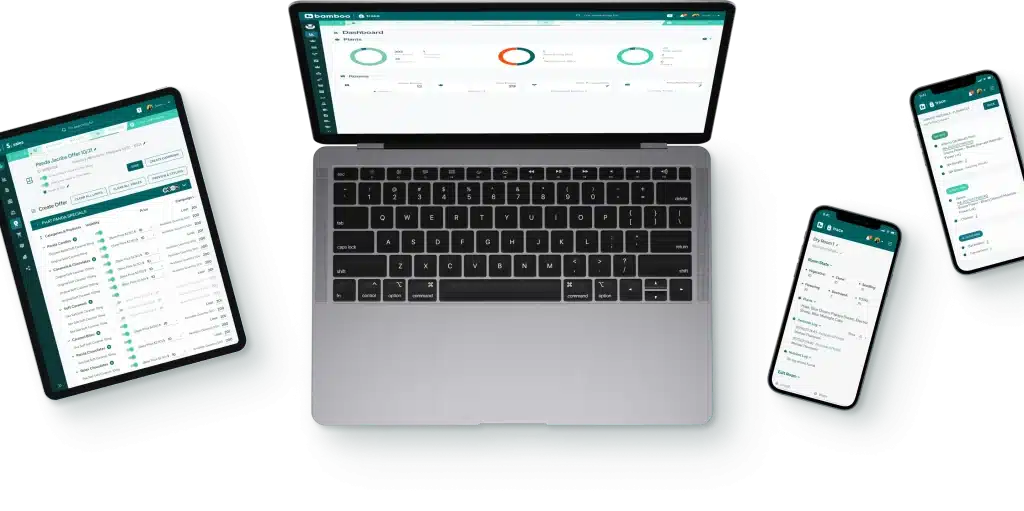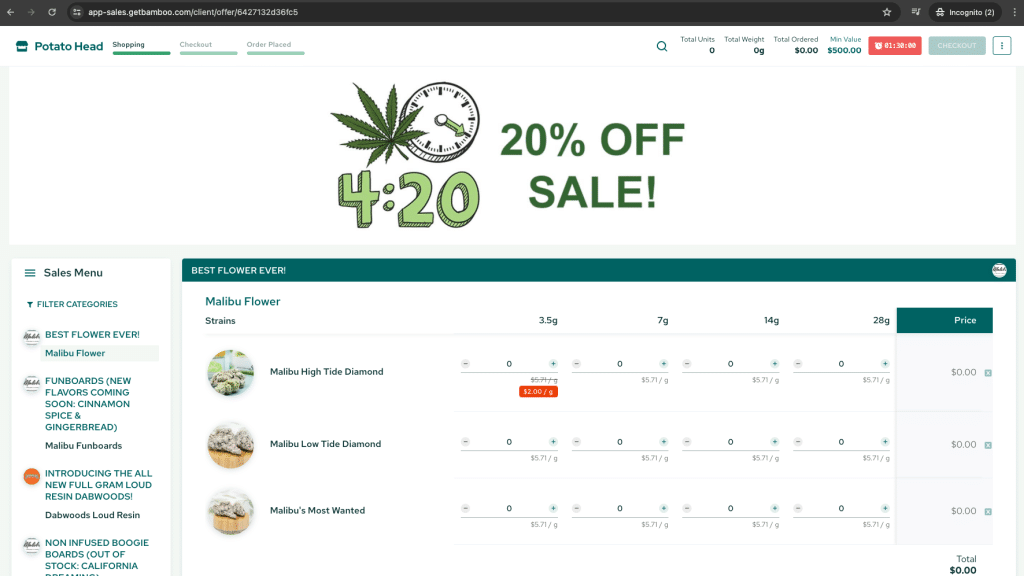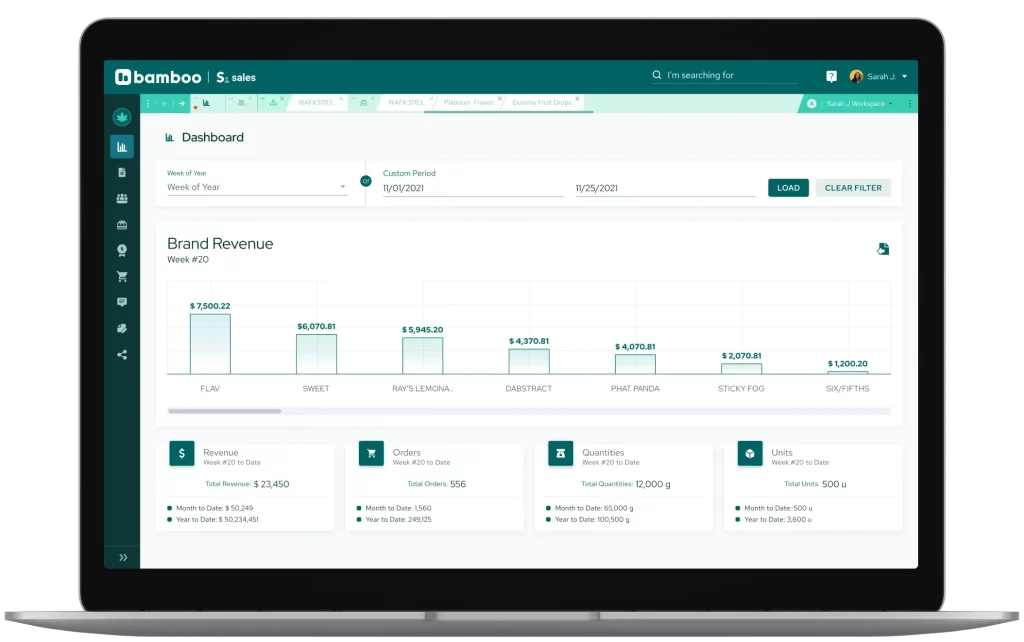Arizona Seed to Sale Cannabis Software
Bamboo offers customized software solutions designed specifically for Arizona’s cannabis industry, helping businesses streamline operations, enhance traceability, and optimize sales strategies.
With Bamboo Sales and Trace, cannabis brands in Arizona can effectively manage inventory, maintain compliance with state regulations, and capture revenue opportunities. Boasting live inventory tracking, customizable sales interfaces, and integrated compliance tools, Bamboo empowers cannabis businesses to thrive and grow within Arizona’s dynamic cannabis market.

Arizona's Recreational Market
Arizona’s recreational cannabis market has experienced significant growth and development since its launch in January 2021. Here’s an overview of some key aspects:
- Sales and revenue:
- According to the Arizona Department of Revenue, total adult-use cannabis sales for the 2023 calendar year reached around $1.2 billion, a 40% increase from the previous year.
- The state collected approximately $180 million in cannabis tax revenue, which is allocated to various programs, including education, public health, and infrastructure projects.
- Market trends:
- The market saw a continued shift towards cannabis-infused beverages and edibles, with new product innovations driving consumer interest.
- Concentrates and vape products also gained market share, particularly among younger consumers.
- Prices remained competitive, with increased supply and production efficiency putting downward pressure on retail prices.
- Regulatory changes:
- In mid-2023, the Arizona Department of Health Services implemented new packaging and labeling requirements to enhance product safety and consumer information.
- The state also expanded the list of qualifying conditions for medical cannabis, allowing more patients to access the program.
- Industry developments:
- Several large-scale cultivation and manufacturing facilities came online, increasing the state’s production capacity and product variety.
- Some major out-of-state cannabis companies entered the Arizona market through acquisitions and partnerships with local operators.
- The state issued additional licenses for adult-use retail stores, expanding access to legal cannabis products.
- Social equity:
- Arizona continued to implement its social equity program, which provides licenses and resources for individuals from communities disproportionately impacted by cannabis prohibition.
- The state also launched a new expungement program to help individuals clear their records of past cannabis convictions.
- Challenges:
- The rapid growth of the market led to some supply chain bottlenecks and shortages of certain products, particularly in rural areas.
- The state faced ongoing challenges related to the illicit market, with law enforcement working to combat unlicensed businesses and diversion.
Overall, Arizona’s recreational cannabis market experienced robust growth and maturation, with increasing sales, product innovation, and regulatory refinements. The state remains focused on promoting a well-regulated and equitable industry that generates revenue and creates opportunities for diverse communities. However, challenges such as supply chain management and the illicit market will require continued attention and collaboration between regulators, industry stakeholders, and law enforcement.
Arizona's Road to Recreational Cannabis
Arizona’s journey to legalizing recreational cannabis has been marked by several ballot initiatives and a gradual shift in public opinion. Here’s a timeline of the key events leading up to legalization:
- 1996: Arizona voters approved Proposition 200, allowing doctors to prescribe medical cannabis. However, the law was not implemented due to conflicts with federal law.
- 2002: Voters rejected Proposition 203, which would have legalized medical cannabis.
- 2010: Proposition 203, the Arizona Medical Marijuana Act, was narrowly approved by voters, legalizing medical cannabis in the state.
- 2016: Proposition 205, which would have legalized recreational cannabis, was narrowly defeated, with 51.3% of voters opposing the measure.
- 2019-2020: Several initiatives were launched to place recreational cannabis legalization on the 2020 ballot, with the Smart and Safe Arizona Act (Proposition 207) emerging as the leading campaign.
- November 2020:
- On November 3, Arizona voters approved Proposition 207 with 60% of the vote, legalizing recreational cannabis for adults 21 and older.
- The measure allowed for the possession, consumption, and cultivation of cannabis in private residences, as well as the establishment of a regulated commercial cannabis industry.
- January 2021:
- Provisions of Proposition 207 allowing adults 21 and older to possess up to one ounce of cannabis and to cultivate up to six plants at home took effect on January 1.
- The Arizona Department of Health Services (ADHS) began accepting applications for adult-use cannabis establishment licenses from existing medical cannabis dispensaries, which were given priority in the licensing process.
- January-February 2021: The ADHS approved the first adult-use cannabis establishment licenses, allowing sales to begin at existing medical cannabis dispensaries that had received recreational licenses.
- 2021-2023:
- The Arizona adult-use cannabis market has grown rapidly, with sales exceeding $1 billion in the first year of legalization.
- The state has continued to issue licenses for new cannabis establishments, including cultivation facilities, product manufacturers, and testing laboratories.
- Tax revenue from cannabis sales has been allocated to various programs, including community colleges, public safety, and public health initiatives.
Arizona’s successful legalization of recreational cannabis can be attributed to a combination of factors, including the state’s existing medical cannabis infrastructure, growing public support for legalization, and a well-organized campaign that focused on the potential economic benefits and social justice implications of legalization. As the state’s adult-use cannabis industry continues to mature, it will be important to monitor regulatory developments and the impact of legalization on public health and safety.
Traceability, Compliance & Regulation in Arizona
In Arizona, recreational cannabis became legal after the passage of Proposition 207, also known as the Smart and Safe Arizona Act, in November 2020. The Arizona Department of Health Services (ADHS) is responsible for regulating and overseeing the state’s cannabis industry. Here are the key aspects of recreational cannabis traceability, compliance, and regulation in Arizona:
- Licensing:
- The ADHS issues licenses for cannabis establishments, including retail stores, cultivation facilities, manufacturing facilities, and testing laboratories.
- Existing medical cannabis dispensaries were given priority to apply for adult-use licenses.
- License applicants must meet certain requirements, such as demonstrating financial capability and passing background checks.
- Seed-to-Sale Tracking:
- Arizona utilizes a seed-to-sale tracking system to monitor the cultivation, production, and sale of cannabis products.
- Licensed cannabis businesses are required to use the state’s chosen tracking system to record and report inventory, sales, and transfers of cannabis products.
- Product Testing and Safety:
- All cannabis products must be tested by licensed third-party laboratories for potency, contaminants, and other quality control measures.
- Products must meet specific safety and quality standards before they can be sold to consumers.
- Packaging and labeling requirements ensure that products are properly identified and include necessary warnings and disclosures.
- Purchase and Possession Limits:
- Adults 21 years and older can purchase and possess up to one ounce of cannabis or five grams of concentrate.
- Cannabis products can only be purchased from licensed retail stores.
- Home Cultivation:
- Arizona allows adults 21 and older to grow up to six cannabis plants at their primary residence for personal use.
- No more than 12 plants can be grown at a single residence, regardless of the number of adult occupants.
- Taxation:
- Recreational cannabis sales are subject to a 16% excise tax, in addition to regular sales tax.
- Tax revenue is allocated to various programs, including community colleges, public safety, and public health initiatives.
- Local Control:
- Local governments have the authority to regulate cannabis businesses within their jurisdiction, including limiting the number of licenses or prohibiting certain types of establishments.
- However, they cannot completely prohibit the sale or cultivation of cannabis.
- Advertising and Marketing Restrictions:
- Cannabis businesses are subject to strict advertising and marketing regulations to prevent targeting underage individuals and to promote responsible consumption.
- Advertising cannot be misleading or deceptive and must include required warnings and disclosures.
- Enforcement and Penalties:
- The ADHS is responsible for enforcing cannabis regulations and conducting inspections of licensed establishments.
- Violations can result in fines, license suspensions, or revocations, depending on the severity and frequency of the infraction.
These regulations aim to establish a safe, regulated, and responsible recreational cannabis industry in Arizona while protecting public health and safety. Businesses operating in the cannabis industry must stay informed about any changes or updates to these regulations to maintain compliance.
Why Bamboo for Arizona?
Are you ready to stand out from the crowd of Leaflink, Distru, and other marketplace users in Arizona’s burgeoning cannabis industry?
Introducing Bamboo, your all-encompassing solution tailored specifically for the state’s unique requirements. Bamboo makes traceability and product labeling a breeze. Even better, Bamboo Trace comes at no extra cost for all Arizona users, ensuring smooth and effortless traceability alongside integrated Bamboo Sales.
Arizona’s cannabis businesses are increasingly embracing Bamboo’s proactive sales strategies. Envision user-friendly menus for quick ordering on any device, streamlining the process for your customers. Our sales menu website integration is simple to set up and can even boost your revenue. Plus, Bamboo’s nifty feature allows you to create as many proposal orders as needed, making life easier for your buyers. With Bamboo Sales, you’ll also gain access to powerful data analytics with customizable reporting and much more!
Ready to revolutionize your operations and thrive in Arizona’s newly established recreational cannabis market? It’s time to make the switch to Bamboo, the solution tailored to meet the unique needs of the state’s cannabis industry.
Bamboo Trace
✔ Quick-action buttons available in every module for swift navigation and action execution.
✔ Simplified traceability through real-time two-way synchronization with Arizona seed-to-sale system.
✔ Receive instant notifications for important updates and events.
✔ Work in offline mode, accessible on both mobile and desktop devices, especially useful during periods of downtime in traceability API systems.
✔ Ability to support multiple licenses for comprehensive management of operations.
✔ Customize label templates to meet Arizona’s regulations and efficiently generate multiple labels for various plant and product requirements.
✔ Comprehensive management of Strains, Rooms, Propagations, Grow Cycles, Plants, Harvests, Disposals, Inventories, Conversions, QA Samples, and more, all integrated within Bamboo Trace.
✔ Effortlessly process orders and generate manifests in just minutes for enhanced efficiency.

Bamboo Sales
✔ Utilize the finest Sales Menus available in Cannatech for enhanced sales strategies.
✔ Seamlessly integrate Sales Menus with your website for expanded reach and accessibility.
✔ Simplify email marketing efforts with the built-in feature tailored for sending sales menus effortlessly.
✔ Gain insights through comprehensive sales analytics and reporting on clients, sales reps, and customizable metrics.
✔ Generate numerous recommended orders (proposals) to cater to diverse client needs.
✔ Customize Real-time Sales Menus according to preferences and branding.
✔ Easily manage discounts, credits, pricing tiers, and distribution lists for streamlined operations.
✔ Efficiently handle all your sales enablement strategies within the Bamboo Sales platform.

